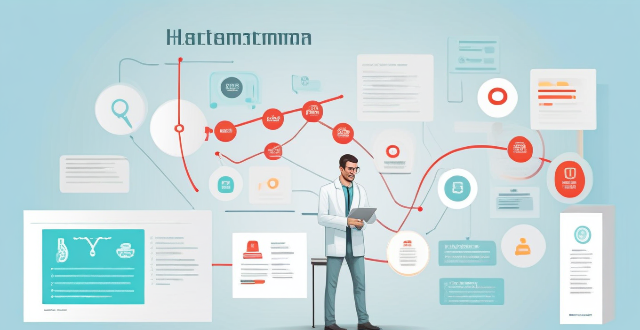The Internet of Things (IoT) has revolutionized the healthcare industry by enabling remote monitoring, data collection, and analysis. Wearable devices, telehealth systems, and home health equipment can monitor vital signs and activity levels, reducing the need for in-person visits. IoT devices can feed data directly into electronic health records and predictive analytics can identify potential health issues before they become serious. Hospital management and operations can be optimized through asset tracking, environmental monitoring, and energy management. Patient safety and compliance can be improved through fall detection, medication management, and infection control measures. Chronic disease management can be enhanced through continuous glucose monitors, wearable devices for cardiovascular disease management, and smart inhalers for respiratory disease management.

Applications of IoT in Healthcare
The Internet of Things (IoT) has revolutionized the healthcare industry by enabling remote monitoring, data collection, and analysis. Here are some of the applications of IoT in healthcare:
Remote Patient Monitoring
- Wearable Devices: Wearable devices such as smartwatches, fitness trackers, and medical alert systems can monitor vital signs, activity levels, and other health metrics. This data can be sent to healthcare providers for analysis and intervention if needed.
- Telehealth Systems: Telehealth systems allow patients to connect with their doctors remotely through video conferencing or messaging. This reduces the need for in-person visits and allows doctors to monitor patients' conditions more closely.
- Home Health Equipment: Home health equipment such as blood pressure monitors, glucose meters, and oxygen tanks can be connected to IoT platforms to provide real-time data on patients' conditions.
Data Collection and Analysis
- Electronic Health Records (EHRs): EHRs store patient information electronically, making it easier for healthcare providers to access and share patient data. IoT devices can feed data directly into EHRs, reducing the risk of errors and improving efficiency.
- Predictive Analytics: By analyzing large amounts of patient data from IoT devices, healthcare providers can identify patterns and predict potential health issues before they become serious.
- Clinical Trials: IoT devices can collect data on patients participating in clinical trials, providing more accurate and comprehensive information on drug efficacy and side effects.
Hospital Management and Operations
- Asset Tracking: IoT sensors can be used to track hospital assets such as medical equipment, supplies, and medication. This helps ensure that resources are used efficiently and reduces the risk of lost or misplaced items.
- Environmental Monitoring: IoT sensors can monitor temperature, humidity, and air quality in hospital rooms, helping to maintain a safe and comfortable environment for patients and staff.
- Energy Management: IoT devices can optimize energy usage in hospitals by controlling lighting, heating, and cooling systems based on occupancy and usage patterns.
Patient Safety and Compliance
- Fall Detection: Wearable devices equipped with accelerometers can detect falls and alert healthcare providers or emergency services if needed.
- Medication Management: Smart pill bottles and packaging can remind patients to take their medications on time and monitor adherence to prescribed regimens.
- Infection Control: IoT sensors can monitor hand hygiene compliance among healthcare workers and alert them when they need to wash their hands or use sanitizer.
Chronic Disease Management
- Diabetes Management: Continuous glucose monitors (CGMs) can provide real-time data on blood sugar levels, allowing patients to make adjustments to their insulin dosages as needed.
- Cardiovascular Disease Management: Wearable devices can monitor heart rate, rhythm, and other cardiovascular metrics, helping patients manage their conditions more effectively.
- Respiratory Disease Management: Smart inhalers can track medication usage and alert patients when they need to take their medications or refill their prescriptions.
In conclusion, the applications of IoT in healthcare are vast and varied, ranging from remote monitoring and data analysis to hospital management and chronic disease management. As technology continues to advance, we can expect even more innovative uses of IoT in healthcare in the future.